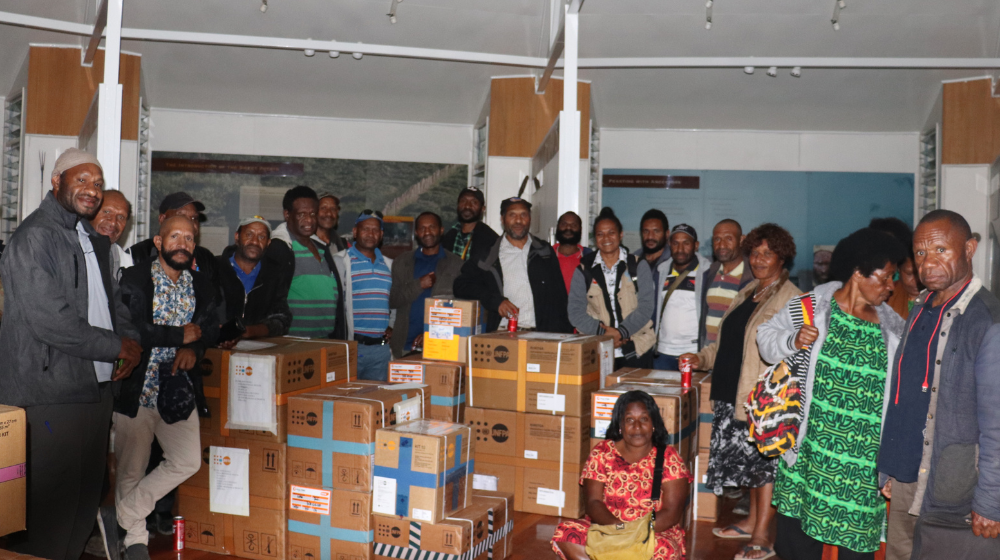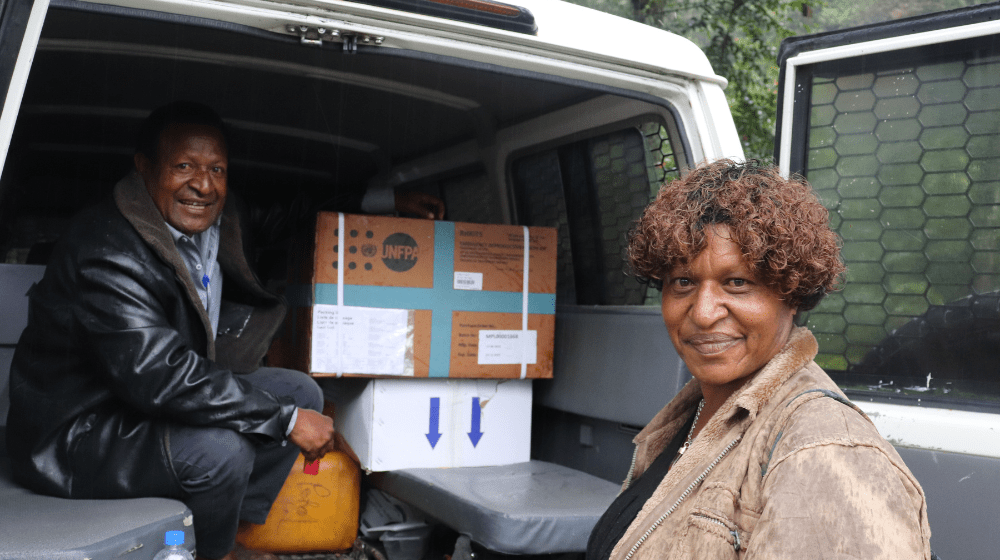After closing its doors for almost a year following election-related violence in 2022, Porgera Urban Clinic re-opened two months ago without basic equipment for safe births. With the delivery of reproductive health kits from the United Nations Population Fund (UNFPA), mothers in the district once again have access to safe delivery services.
33 Reproductive Health Kits (RH kits) were formally handed over to the Enga Provincial Health Authority this week to be issued to the 3 district hospitals affected by election-related violence; Kompiam District Hospital, Porgera District Hospital, and Laiagam District Hospital. Enga PHA, while also conducting its Annual Health Review 2022, distributed the RH kits to the health facilities on Friday last week.
These kits were procured by UNFPA with support from the United States Agency for International Development (USAID), as part of UNFPA’s efforts to ensure that women and girls have access to basic health services, including sexual and reproductive health and protection services, especially during a humanitarian crisis.
Impact of Election-Related Violence in Enga Province
Between May and September 2022, an estimated 90,000 people in the Highlands Region of Papua New Guinea were displaced by violence related to the National Election 2022. Much of this conflict was situated in Enga Province, with existing tensions surrounding the closure of the Porgera mine worsening during the election period.
In addition to the large number of displaced persons, women were vulnerable to sexual violence and accusations of sorcery. Even after the election was concluded, ongoing instability in Kompiam, Progera, and Laiagam districts made the provisions of humanitarian aid challenging.
“My health facility resumed operations two months ago following its closure for almost a year,” Porgera Urban Clinic Nursing Officer Ms. Masi Mangan shared. “We have had mothers coming in to deliver since, but we have been lacking the basic tools and equipment to ensure a safe delivery.”
As services have resumed in the conflict-affected districts, UNFPA has been able to deliver life-saving equipment to healthcare providers.
“We had no delivery trays and we had been requesting them for a while now,” said Ms. Mangan. “To see that this kit contains all that we need and more, we are very happy and excited!”

Reproductive Health Kits Provide Essential Equipment for Safe Deliveries and Medical Support to Survivors of Sexual Violence
The Reproductive Health Kits are divided into block one and block two, consisting of 10 kits in total. Block one contains RH kits 1 - 5 which are items intended for use by service providers delivering reproductive health care at community and primary health care levels through community-based interventions. These kits contain medicines and other disposable items.
Block two contains RH kits 6-10, containing both disposable and reusable items. The kits are intended for use by health care providers with midwifery qualifications, with experience at the health center or hospital level.
This suite of kits enables UNFPA to deliver the correct equipment and medicines for the level of care available in affected communities, ensuring we are providing health care practitioners with only the equipment they are trained to use. The health centers in the Kompiam-Ambum, Laiagam, and Porgera districts received a total of seven kits, including RH Kits 1, 2A, 2B, 3, 5, 6 and 10.
Kits 2, 6, and 10 contain equipment essential for the prevention of maternal and new-born deaths, including tools to prevent infection. Kit 3 assists providers in responding to survivors of Gender-Based Violence and Kit 5 assists in the prevention of sexually transmitted infections and HIV.
Ensuring Reproductive Health Services to The Last Mile
Deputy Director for Public Health at Enga PHA, Mr. John Masili, urged the district health facilities to completely utilize these kits.
“Do not let it go to waste,” he said. “If you see that an aid post might need one of these kits, please pass it on. We must ensure that these kits are successfully used for their intended purpose.”
Mr Masili welcomed the support of UNFPA and USAID in improving the availability of essential medical supplies in the province.
“We lack most of these items in our health facilities and we appreciate UNFPA for this support that was also made possible by USAID.”
In addition to these kits, UNFPA, with the support of USAID, has procured dignity kits which will be distributed to women and girls affected by election-related violence to maintain healthy hygiene practices. The organization is also supporting healthcare providers with training to support survivors of gender-based violence.
UNFPA and Humanitarian Emergencies
UNFPA anticipates and implements efficient, quality and inclusive emergency responses to ensure that the reproductive health and protection needs are addressed before, during and after a crisis. UNFPA works closely with national governments, civil society organizations and other partners to build the capacity of institutions and communities and to advocate for sexual and reproductive health and protection needs. UNFPA works to ensure that life-saving supplies and services are accessible for the affected population. Priority areas include maternal health, family planning, prevention of sexually transmitted infections including HIV, adolescent health, and prevention and response to gender-based violence.


